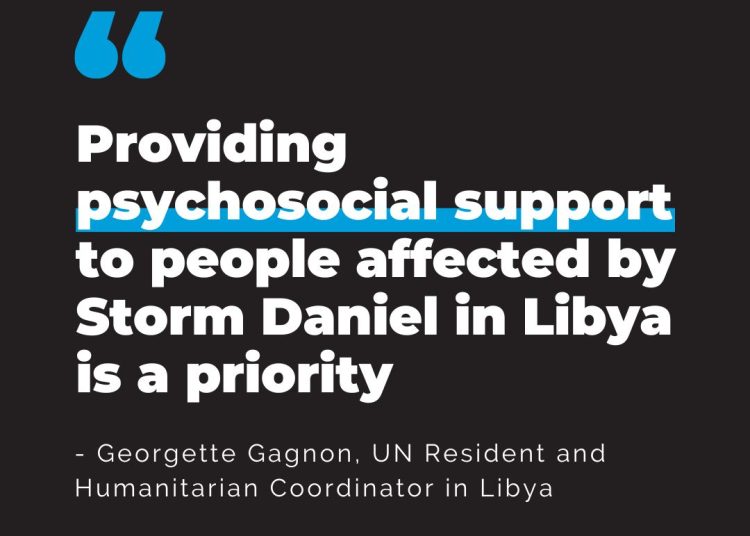Providing psychosocial support to the thousands of people affected by Storm Daniel that hit eastern Libya 11 days ago is a priority, Georgette Gagnon, United Nations Resident and Humanitarian Coordinator said yesterday.
The UN reported that during Gagnon’s two-day visit to Benghazi, she met families who fled their flood-ravaged homes and sought safety in Benghazi, 250 kilometres away, who spoke of their loss, and of their concern both for their children’s education and of the unknown.
“It’s heart-wrenching to hear what families have gone through and the severe distress they have endured,” Gagnon said. “The mental toll is very high, and support is urgently needed to help people heal.”
More than 43,000 people have been displaced by the floods in eastern Libya. Most of them are staying with relatives in nearby areas, while some 2,780 people have travelled to Benghazi.
Priority needs
In addition to medical care, disease control and prevention, and the testing and analysis of water sources, psychosocial support has been identified as one of the priority needs for affected people, according to an assessment by UN agencies who were recently in Beida, Derna and Sousse.
Aid is getting into Derna
Aid is getting into Derna and the nearby areas. UNICEF shipped 65 metric tons of life-saving medical supplies and water, sanitation and hygiene items, child protection supplies and delivered emergency medical kits to primary care services to support 15,000 people for three months and hygiene kits for almost 1,000 people and 500 clothing kits.
Mobile psychosocial support teams are being set up with social welfare authorities and two NGO partners.
The UN Refugee Agency (UNHCR) is distributing blankets, plastic tarpaulins and kitchen equipment to 6,200 displaced families in Derna and Benghazi.
The World Food Programme (WFP) has distributed food rations to more than 9,000 people. This includes dry rations to cover their food needs for 15 days.
The World Health Organization (WHO) shipped 28 tons of medical supplies and donated ambulances and medical kits. In addition, a WHO team met with the health authorities in Derna today and agreed to prioritize mental health support to help people cope with the distress they experienced during this catastrophe.
The International Organization for Migration (IOM) has delivered non-food items to nearly 3,000 migrants and displaced persons. The agency also delivered medicines and supplies for 5,000 people in Derna and 4,000 families in Benghazi.
United Nations agencies have appealed for US$71.4 million to meet the immediate needs of 250,000 affected people in the next three months.







